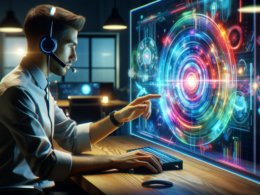In a fiery debate that erupted over the weekend, two of the most influential figures in artificial intelligence (AI) and deep learning, Yann LeCun and Yoshua Bengio, fiercely discussed the potential risks and safety concerns surrounding AI. This debate comes as part of a larger discourse on the implications of AI, which has been the subject of increasing attention and concern in the tech industry and beyond.
Yann LeCun’s Perspective
LeCun, Meta’s chief AI scientist, initiated the debate with a post on his Facebook page, calling on the “silent majority” of AI scientists and engineers who believe in the power and reliability of AI to voice their opinions. His comments sparked a lively discussion with over 150 comments, many from notable figures within the AI community.
“We need to design AI systems for safety rather than imagining catastrophic scenarios,” LeCun highlighted.
LeCun countered Bengio’s claims about investment in AI safety, asserting that there is a significant amount of funding being poured into making AI systems safe and reliable. He also disagreed with the comparison of AI systems to weapons, stating that AI is designed to enhance human intelligence, not to cause harm.
Yoshua Bengio’s Perspective
Bengio, founder of Element AI and a professor at the University of Montreal, responded to LeCun’s post, challenging his perspective on AI safety, the importance of governance, and the potential risks of open-source AI platforms. Bengio argued for the importance of prudence, stating that we still do not understand how to design safe, powerful AI systems, and highlighted the need for major investment in AI safety and governance.
“While we cannot reduce risks to zero, we can minimize harm by restricting access to powerful AI systems,” Bengio emphasized.
Bengio also agreed with Jason Eisner, director of research at Microsoft Semantic Machines and professor at Johns Hopkins University, who supported the analogy of AI to weapons. This debate revealed that even among esteemed researchers, there is considerable disagreement regarding AI’s potential risks, the effectiveness of current safety measures, and the best path forward.
Implications and Urgency
The AI debate is not just confined to academic circles. As AI becomes increasingly embedded in everyday life, its potential impact has become a topic of widespread concern. Critics argue that unchecked progress in AI could lead to job displacement, privacy violations, or even existential risks, while proponents contend that AI could unlock unprecedented advancements in healthcare, education, and other sectors. This latest debate only underscores the urgency of these issues.
“As AI technologies continue to evolve at a rapid pace, the need for thoughtful, informed discourse on their implications becomes ever more pressing,” emphasizes the industry.
The industry will be watching closely as these discussions continue to unfold.










